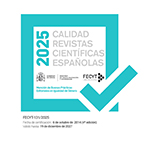La configuración de la clase trabajadora navarra durante el tardofranquismo. Una visión desde el materialismo histórico
Resumen
A lo largo del franquismo, observamos una transformación tan significativa de la clase trabajadora navarra que justifica su estudio detallado. Se produce una extraordinaria evolución desde su escasa presencia pública en los cuarenta hasta su notoria irrupción en los setenta, siendo un elemento determinante en el devenir global de la región y coadyuvador de las mutaciones que se operaban en el conjunto del país. Las fuerzas económicas y materiales que se desarrollaron en aquel periodo histórico fueron palancas decisivas de su conformación como clase, en estrecha interrelación con factores cruciales como una presencia destacadísima del hecho religioso, sus raíces culturales ancestrales, sus específicas tradiciones organizativas, así como las dinámicas propias de las clases y grupos sociales de la zona, entre otros. Este alambicado y dialéctico entrelazamiento fue pergeñando un sugestivo escenario en el momento en que se estaba produciendo el tránsito de la dictadura franquista hacia un régimen democrático. Para una comprensión más cabal de este proceso, se emplearán herramientas analíticas procedentes del materialismo histórico.
Descargas
Descarga artículo
Licencia
La revista Cuadernos de Historia Contemporánea, para fomentar el intercambio global del conocimiento, facilita el acceso sin restricciones a sus contenidos desde el momento de su publicación en la presente edición electrónica, y por eso es una revista de acceso abierto. Los originales publicados en esta revista son propiedad de la Universidad Complutense de Madrid y es obligatorio citar su procedencia en cualquier reproducción total o parcial. Todos los contenidos se distribuyen bajo una licencia de uso y distribución Creative Commons Reconocimiento 4.0 (CC BY 4.0). Esta circunstancia ha de hacerse constar expresamente de esta forma cuando sea necesario. Puede consultar la versión informativa y el texto legal de la licencia.











